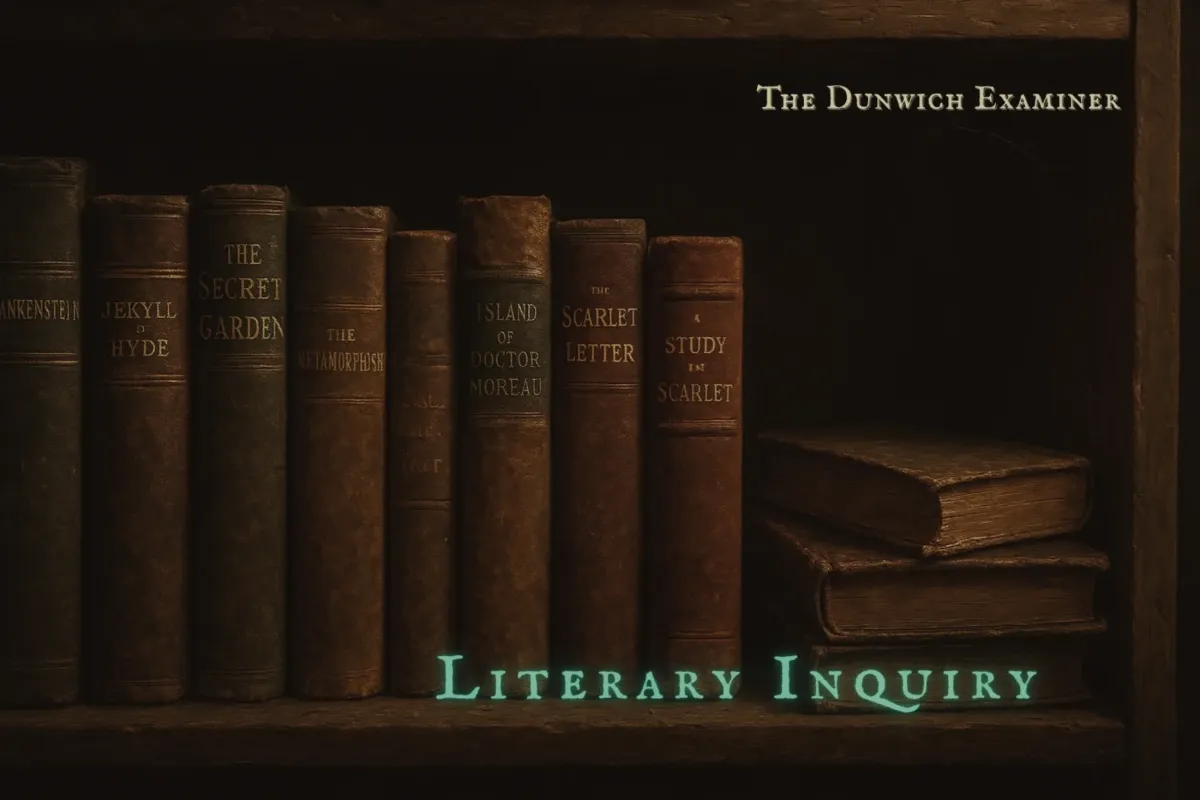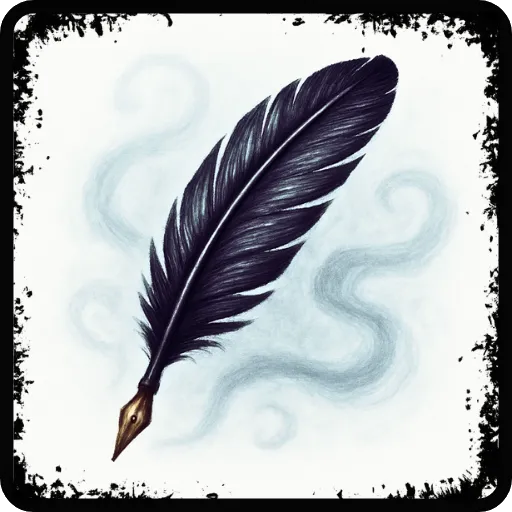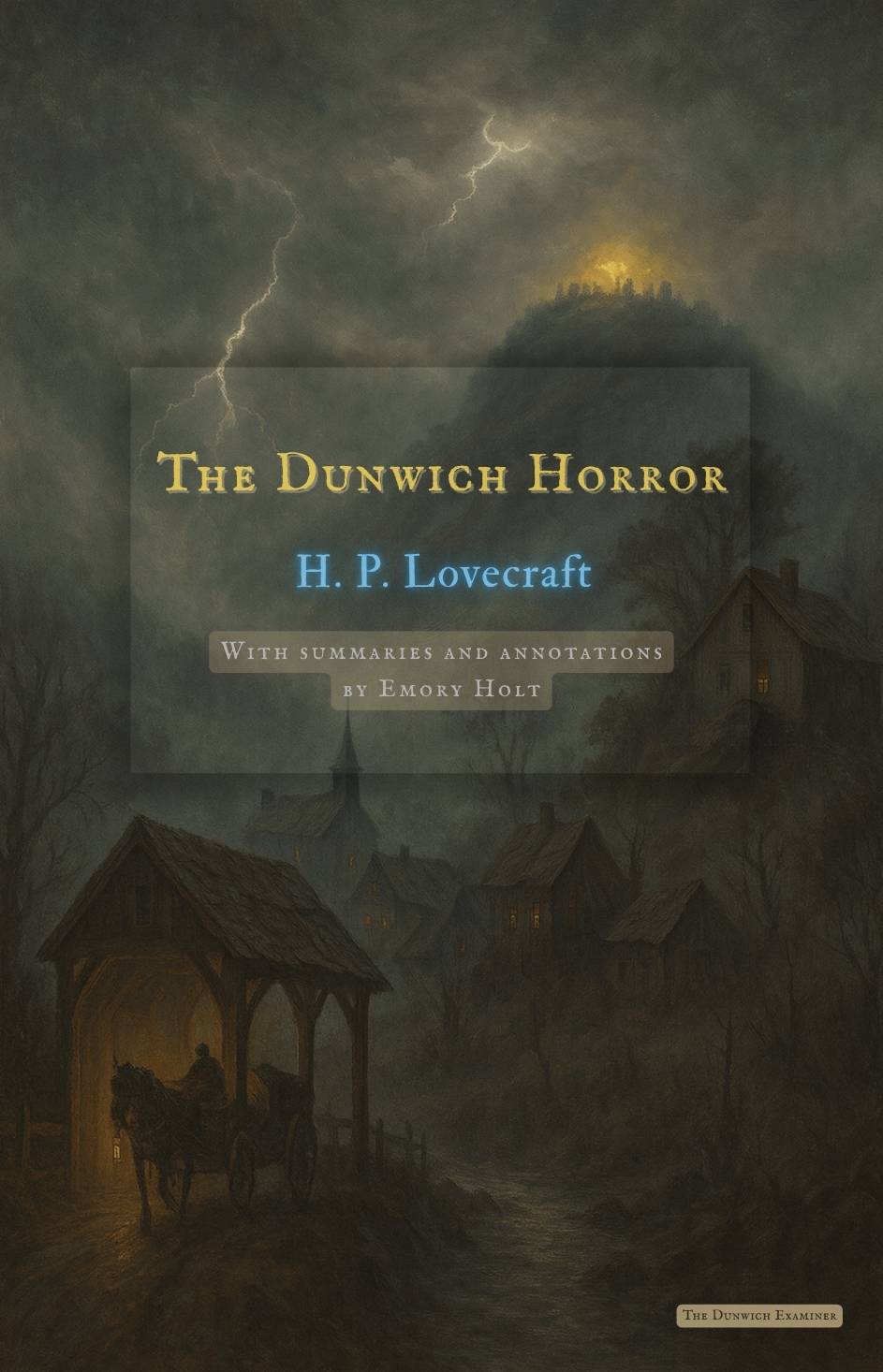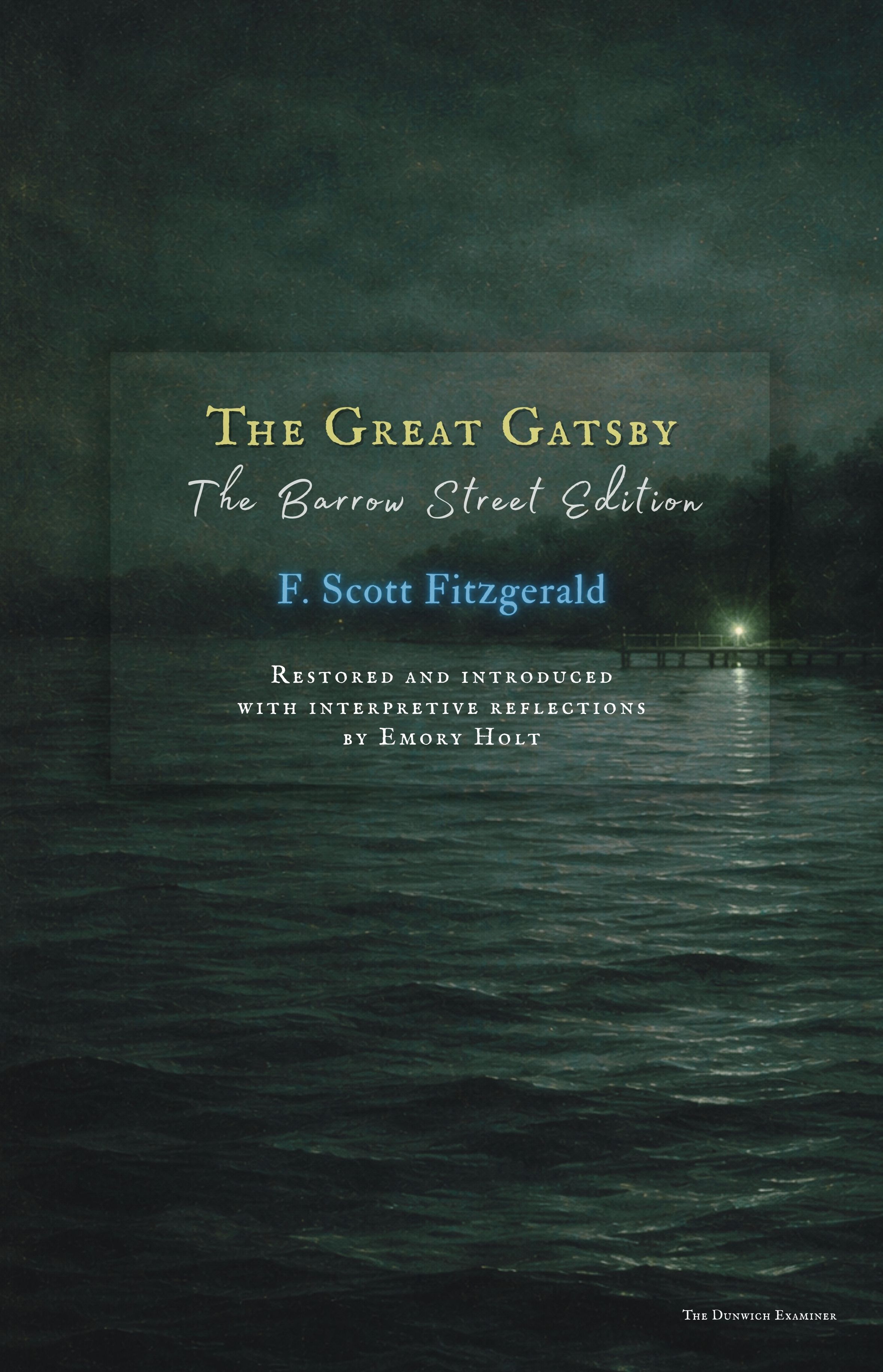Archive of Literary Inquiry

About The Archive of Literary Inquiry
There are corners of the Barrow Street Annex that even I hesitate to visit after dusk. The floorboards there breathe with age, and the air carries a weight that feels older than dust. It was in one such alcove, beyond the main corridor of the periodicals wing where a neglected lamp hung at a permanent lean, that I first found the bound volumes which became the foundation of what I now call the Archive of Literary Inquiry.
They were not organized with any librarian’s sense of order. They had been left to the slow accidents of time, covered in dust and silence. Some carried faint catalog stamps from the earliest days of The Dunwich Examiner’s publishing history, while others bore no markings at all. The bindings were split, the gold leaf dimmed, the lettering nearly erased. Yet the names that emerged through the grime were unmistakable: Shelley, Stevenson, Hawthorne, London, Wells, and Kafka. Here was the seedbed of modern imagination, hidden on a forgotten shelf of oak darkened by years. These were stories of creation and transgression, of wilderness and conscience, of men who sought to know too much and could never again forget what they learned.
That first evening I began to catalogue the spines with a reverence that bordered on superstition. One by one I lifted each volume from its resting place and turned the brittle pages that exhaled the scent of parchment and neglect. Frankenstein lay among them, its margins filled with delicate handwriting that trembled whenever it reached the word “life.” The Island of Doctor Moreau was there as well, its final pages water-stained as if the sea itself had reached for it. The Scarlet Letter bore an embossed seal from the long-dissolved Dunwich Reading Society. Whoever had assembled these editions and hidden them away had done so with deliberate care. The question that lingered was why.
Weeks passed before I began to suspect that the answer was not within any single book but within their shared design. Each explored the same restless questions that haunt The Paranormal Investigations of Nathaniel Crowe: guilt, revelation, the peril of knowledge, and the weight of memory. Crowe’s chronicles, though drawn from the darker edges of the supernatural, are another form of the same inquiry. These volumes speak to that lineage of curiosity, the one that began long before Crowe’s time and continues still in every human attempt to confront the unknown.
Once I understood that connection, my purpose became clear. If these works had been buried through neglect or intention, it was the duty of The Dunwich Examiner to return them to the light. Yet they could not simply be reprinted. The modern reader, accustomed to haste and surface, often misses the intricate design within these stories. Their symbols and quiet structures reveal the philosophical questions that bind them across generations. To make these layers visible, I began preparing annotated editions of each text, restored and newly typeset, accompanied by observations drawn from my own research and from the marginal notes found in the originals.
The annotations are meant to walk beside the reader, not ahead. They act as quiet companions rather than verdicts. In Frankenstein they follow the uneasy balance between creation and abandonment, between light and blasphemy. In Jekyll and Hyde they trace the boundaries of duality and the architecture of the divided self. In The Secret Garden they observe the slow return of wonder to a place once given to decay. Even Call of the Wild and The Island of Doctor Moreau reveal their kinship through the same question that binds them all. What remains of our humanity when the borders of conscience and nature begin to blur?
To make the Archive easier to navigate, I have arranged these works into several broad groupings. Each gathers stories that share a similar heartbeat, though none are bound too tightly. Some lean toward the Gothic or the uncanny, while others reach into philosophy or social reflection. These divisions are not walls but bridges, pathways through the same landscape of human thought. Whether a reader begins with fear, curiosity, or moral reckoning, each road eventually meets the others in the same territory, the search for meaning when certainty fails.
Even now, the Archive feels alive. The volumes hum faintly when the lamps burn low, as if they are aware of one another’s presence. On nights when the wind drifts through the cracked windowpanes, I imagine the books whispering across the shelves. Perhaps that is what literature truly is, an unending conversation among the living and the dead, each voice calling another to speak.
In this way, the Archive of Literary Inquiry stands apart from the Examiner’s chronicles yet remains in quiet dialogue with them. Nathaniel Crowe seeks evidence in the physical world. These authors seek it in the human mind. Both illuminate the same shadowed boundary where reason ends and imagination must begin. Each work, whether fiction or investigation, is an attempt to chart the invisible.
You are invited to explore these restored volumes as companions in that same exploration. Each carries a trace of its rediscovery along with helpful annotations to guide the modern reader through the labyrinth. The annotations are not interruptions but lanterns, small flames meant to reveal what time and habit have hidden. If you find echoes of Crowe’s world here, or reflections of your own, accept them as signs that this conversation still continues.
The shelves of Barrow Street have not yet yielded all their secrets. For every book reclaimed from shadow, another waits unseen. The inquiry is unending, and perhaps that is its true beauty.
Filed for The Dunwich Examiner’s Archive of Literary Inquiry,
Emory Holt, Barrow Street Annex, Dunwich, Massachusetts
Browse the Archive
Mystery
& Suspense


Categories will be added as works in those categories are published.
Gothic & Supernatural
The Dunwich Horror
In the remote hills of Dunwich, whispers of witchcraft and an unnatural birth stir beneath crumbling farms and ancient stones. When a monstrous presence begins to walk unseen, Dr. Armitage and his companions must confront an evil that defies nature itself, and threatens to tear open the veil between worlds.


Social Conscience & Historical
The Great Gatsby
This Barrow Street Edition of The Great Gatsby presents Fitzgerald’s novel with restored text and original reflections by Emory Holt. It invites modern readers to reconsider ambition, illusion, and moral consequence within the social landscape of the Jazz Age, emphasizing the novel’s enduring cultural and historical significance today.


_
You are cordially invited to join our list of correspondents to receive a personal notice upon the release of the next installment in "The Paranormal Investigations of Nathaniel Crowe." Add your name to the ledger on the Sign Me Up page and await further communiqué from the offices of The Dunwich Examiner, where the curious and the uncanny are never far apart.

The Dunwich Examiner is inspired by the public domain works of H.P. Lovecraft.
Original Content © The Dunwich Examiner 2026
Send any additional correspondence to: james at client-informatics.com

